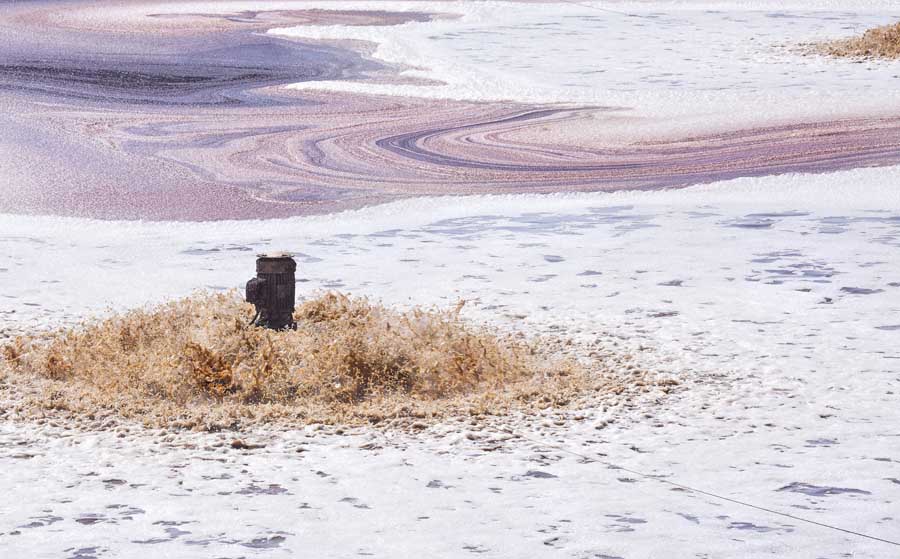
A new requirement for wineries to obtain permits for wastewater, such as in this pond near Benton City, Washington, was one of several hot topics at the meeting. (TJ Mullinax/Good Fruit Grower file photo)
Grape growers, winemakers and retailers want to speak in a more unified voice when sharing their concerns with government officials.
That’s why different facets of Washington’s booming wine industry held their first issues caucus in November in Yakima, Washington.
“I wish we would have thought and done this six, seven years ago, eight years ago,” said Todd Newhouse, a Sunnyside, Washington, viticulturist and chairman of the Washington Association of Wine Grape Growers.
“It would have made some of the work (easier) that we’ve been doing on WAWGG … to have this in front of me before I actually just dove into D.C. or Olympia and learned it on the fly.”
At both the state and federal levels, the industry faces potential changes in taxation, laws and regulations.
Convincing officials to think about wine before acting requires a coalition of voices in an era in which winery and vineyard issues overlap, said Marty Clubb, president of the Washington Wine Institute. “This is really our first attempt to work together.”
The caucus, staged by the growers’ association and the Wine Institute, brought in lobbyists and government regulators to discuss everything from an upcoming wastewater permit requirement to liquor taxes and pesticide drift to President-elect Donald Trump. The groups hope to gather annually.
Wastewater permit
One of the hottest topics of the caucus was a wastewater permit that the state Department of Ecology plans to require of wineries by the end of 2017 to protect groundwater and surface water from discharge pollutants, which can be acidic and high in nutrients.
Stacey Calloway, an Ecology Department water quality program permit writer, told the caucus attendees the wine industry is growing so fast that state regulators cannot write individual permits for each winery or continue letting wineries discharge to sewage or septic systems or wastewater lagoons.
Rule-makers are trying first to understand the wine industry — comprised of facilities, large, small and in-between, that currently dispose of waste water a variety of ways — through public comments, industry meetings and tours.
“It has been challenging getting our arms wrapped around you,” she said.
State legislators have mandated that all wineries have permits, though those producing 2,500 cases per year will fall under more limited rules, a point grower and winery owner Don Phelps questioned.
“How big do you have to be before you’re really causing trouble?” said Phelps, who owns Hard Row to Hoe Vineyards in Chelan, Washington, with his wife, Judy.
Liquor tax
Every year, state lawmakers at least discuss raising taxes on liquor, a topic made even hotter as legislators struggle to catch up with a court-ordered mandate to improve funding for education, said Josh McDonald, executive director of the Wine Institute.
“Bottom line, we’re going to be at risk for tax increases,” McDonald said.
However, the cause of winemakers may improve this year with Republicans holding a slim majority in the Senate, and with Bill Jenkin, a Republican winery owner from Prosser, Washington, elected to the House of Representatives from the state’s 16th Legislative District.
Meanwhile, he suggested wine industry employers begin budgeting for the state’s new minimum wage law, which also requires employers to grant workers sick leave.
Spray drift
Expect the issue of pesticide drift to come up in Olympia, said Mike Schwisow, government affairs director for WAWGG.
Last year, Democratic backers of House Bill 2392 tried to mandate onerous new reporting and notification requirements, Schwisow said. “It would have created a system that is totally unworkable.”
The bill would have required notifying neighbors in writing between two hours and two days before application, a difficult task when you schedule spraying around unpredictable weather and sometimes don’t know where your neighbors are at the drop of a hat.
The bill also would have required monthly reporting to the state Health Department. Current laws require record keeping through the state Department of Agriculture.
The bill never even received a committee hearing but provided a “wake-up call,” he said. The concerns are not new and come up often in Olympia, just as pesticide exposure claims are on the rise. “This is going to be an ongoing issue we have to deal with for quite a while.”
Trump effect
Joe Bischoff, an agricultural lobbyist contracted by the Winegrape Growers of America, took a stab at speculating what a Trump administration would mean for agriculture-based industries, always an educated guess made even harder by his surprise at Trump’s victory, he said.
On the hopeful side, Bischoff said, Trump has an unusually large agriculture advisory team with nearly 70 members and has said he planned to keep nutrition and agriculture issues together in the next Farm Bill, a crucial partnership in getting the bill passed on time.
Also, Vice President-elect Mike Pence should understand farming issues thanks to his role as Indiana’s governor and as a former congressman, though Pence voted against the 2008 Farm Bill.
As for immigration, Bischoff speculated Trump might mandate the use of E-verify, a federal government internet-based service that allows employers to verify eligibility of potential workers, but would probably not try mass deportations despite campaign comments.
The biggest shake-up may happen in the Environmental Protection Agency, an agency Trump railed against during his campaign. Several pesticides commonly used in the fruit industry currently are under review by the agency, including Lorsban (chlorpyrifos). •
– by Ross Courtney






Leave A Comment